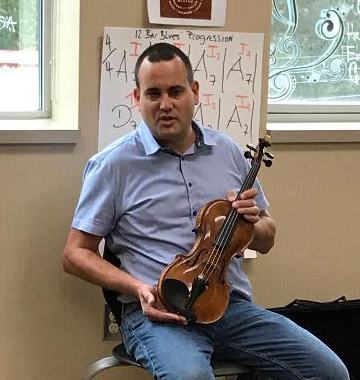Violins of Hope coming to New Orleans

Avshi Weinstein tells students about the Violins of Hope (SJL file)
Four Violins of Hope will be in New Orleans for a series of programs and concerts in January, the week of International Holocaust Remembrance Day.
The Violins of Hope are violins that were played by Jewish musicians during the Holocaust, often in concentration camps. Some of the violinists were murdered, some survived.
Since 1996, Amnon Weinstein has been restoring the violins, with the goal of having them played around the world, to give voice to those whose voices were lost. His son, Avshi, has joined the effort in their Tel Aviv studio.
The Louisiana Philharmonic Orchestra and National World War II Museum are working on the programs for the week. A planning committee is chaired by Ana and Juan Gershanik.
Mimi Kruger, managing director for the orchestra, said “we’ve been working for years to try and bring them to New Orleans.” About three or four years ago, she visited with Ana Gershanik and Arnie Fielkow at the Jewish Federation of Greater New Orleans, to try and coordinate a schedule with the Weinsteins. Then the pandemic hit, and plans were delayed.
Plans are still being finalized, but centerpieces of the week will include two concerts.
An opening reception is planned for Jan. 24 at the museum, where the violins will be displayed during the week. Avshi Weinstein will be visiting, and there are plans for musical pieces to be performed on the violins.
Weinstein will lead a special edition of the museum’s Lunchbox Lecture series on Jan. 25, giving a history of the instruments and the restoration process.
The orchestra will perform on Jan. 26 at 7:30 p.m. at the Orpheum Theatre. Classical violinist Philippe Quint, a multiple Grammy Award nominee from New York, will be featured. He usually plays a 1708 Stradivari violin.
The concert will feature works by Contreras, Korngold, Chaplin, and Shostakovich. A pre-concert talk will be at 6:30 p.m. Tickets are available through the orchestra.
At 10 a.m. on Jan. 26 there will be an open rehearsal, tickets are $10.
There will also be a concert on Jan. 28 at 6 p.m. at the museum’s Freedom Pavilion, featuring works by Weill, Mendelssohn, Williams, Chaplin and Morricone. The concert at the museum is free, but registration will be required.
On Jan. 27, there will be an International Holocaust Remembrance Day commemoration at the museum, including a violin performance and a talk with a Holocaust survivor. Details will be announced soon.
Touro Synagogue is also planning an event with a quartet from the orchestra on Jan. 27.
The orchestra will also have ensemble visits to eight schools, and educational resources for teachers and students will be available.
Education about the Holocaust is a major component at every community that hosts the violins. “Music is so immediate, and does something more than just reading about it can do,” said Kruger.
Sponsorships are available for the week’s events.
In a release, the orchestra stated “We envision a community-wide dialogue through the medium of music and story to address past violence while promoting tolerance, respect, and understanding for identity and diversity.”
Amnon Weinstein learned the craft of the violin from his father, who moved to pre-state Israel from Lithuania in 1938. Over 400 family members were lost in the Holocaust.
After years of reluctance, he started working on violins that had been in the concentration camps. In many cases, the violin was the key to the owner surviving the Holocaust. In some cases, a German official would take the violinist under his wing so he could perform at parties. Some were played by Jewish musicians who were forced to perform as fellow Jews got off the cattle cars, to make the camp seem more normal to the new arrivals, and hide that it was an extermination facility.
One violinist, who was 12 years old and whose parents were murdered, became a favorite musician of a group of Nazi soldiers. They gave him a German outfit, which he wore to his performances at an officer’s club. He would channel information that he overheard to his partisan group, which fed it to the Red Army. He soon smuggled explosives into the club in his violin case, then one night after his performance, set them to detonate after he left.
A violin in the collection that the Weinsteins show is one that they aren’t going to restore. A man in Washington had purchased that violin and planned to restore it, but when he opened it, he found a large swastika and “Heil Hitler,” and a label stating the violin had been restored in 1936. He gave it to the Weinsteins.
Birmingham hosted the violins in April 2018, as an offshoot of their visit to Nashville. The centerpiece concert, “Dreams of Hope,” at Sixteenth Street Baptist Church, where four girls were murdered in a Klan bombing in 1963, became a documentary that aired on PBS stations nationally.
The violins were in Louisville, Ky., in October 2019, and in several communities around South Carolina this past April.



